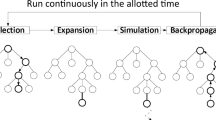Abstract
The problem that we consider here is a basic operations research problem, but it also a special case of the Stochastic Shortest Path with Recourse Problem and the Canadian Travellers Problem in the probabilistic path planning literature, and it is also a special case of maximizing a submodular set function subject to a matroid constraint. Specifically, suppose an agent has a task and suppose that there is a set of actions, any of which the agent might perform, with respective probabilities of the actions successfully accomplishing the task and respective rewards for the agent if the actions are successful; the agent is to select a sequence of some of these actions that will be performed sequentially, until the task is accomplished or the selected actions are exhausted, but there is a budget on the number of actions that can be performed. We provide an efficient algorithm that chooses a sequence of actions that, under the budget, maximize the agent’s expected reward. An example illustrates how, when conditioning on partial selection of actions, there can be changes to the order of the remaining actions’ adjusted utilities. However, we prove and exploit a nesting result involving solutions.
Similar content being viewed by others
References
Andreatta G, Romeo L (1988) Stochastic shortest paths with recourse. Networks 18: 193–204
Bar-Noy A, Schieber B (1991) The canadian traveller problem. In: SODA ’91: Proceedings of the second annual ACM-SIAM symposium on discrete algorithms, pp 261–270
Iwata S, Fleischer L, Fujishige S (2001) A combinatorial, strongly polynomial-time algorithm for minimizing submodular functions. J ACM 48: 761–777
Nemhauser GL, Wolsey LA, Fisher ML (1978) An analysis of approximations for maximizing submodular set functions–I. Math Program 14: 265–294
Papadimitriou CH, Yannakakis M (1991) Shortest paths without a map. Theor Comput Sci 84: 127–150
Polychronopoulos GH, Tsitsiklis JN (1996) Stochastic shortest path problems with recourse. Networks 27: 133–143
Provan JS (2003) A polynomial-time algorithm to find shortest paths with recourse. Networks 42: 115–125
Schrijver A (2000) A combinatorial algorithm minimizing submodular functions in strongly polynomial time. J Comb Theory B 80: 346–355
Vondrak J (2008) Optimal approximation for the submodular welfare problem in the value oracle model. Symposium on theory of computing
Author information
Authors and Affiliations
Corresponding author
Rights and permissions
About this article
Cite this article
Blatz, J., Fishkind, D.E. & Priebe, C.E. Efficient, optimal stochastic-action selection when limited by an action budget. Math Meth Oper Res 72, 63–74 (2010). https://doi.org/10.1007/s00186-010-0305-6
Received:
Accepted:
Published:
Issue Date:
DOI: https://doi.org/10.1007/s00186-010-0305-6




